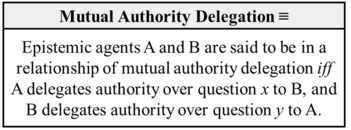Mutual Authority Delegation
What is mutual authority delegation? How should it be defined?
The notion of mutual authority delegation is meant to refer to cases when two agents delegate authority to each other over different questions. Situations like this obtain regularly in the process of scientific change. Thus, a proper definition of the term is of scientonomic importance.
In the scientonomic context, this term was first used by Nicholas Overgaard and Mirka Loiselle in 2016. The term is currently accepted by Scientonomy community.
In Scientonomy, the accepted definition of the term is:
- Epistemic agents A and B are said to be in a relationship of mutual authority delegation iff A delegates authority over question x to B, and B delegates authority over question y to A.
Contents
Scientonomic History
Acceptance Record
| Community | Accepted From | Acceptance Indicators | Still Accepted | Accepted Until | Rejection Indicators |
|---|---|---|---|---|---|
| Scientonomy | 7 September 2016 | The publication of the article by Overgaard and Loiselle titled Authority Delegation is a good indication of acceptance of the question.Overgaard and Loiselle (2016) | Yes |
All Theories
| Theory | Formulation | Formulated In |
|---|---|---|
| Mutual Authority Delegation (Overgaard-Loiselle-2016) | Communities A and B are said to be in a relationship of mutual authority delegation iff community A delegates authority over topic x to community B, and community B delegates authority over topic y to community A. | 2016 |
| Mutual Authority Delegation (Patton-2019) | Epistemic agents A and B are said to be in a relationship of mutual authority delegation iff A delegates authority over question x to B, and B delegates authority over question y to A. | 2019 |
Accepted Theories
| Community | Theory | Accepted From | Accepted Until |
|---|---|---|---|
| Scientonomy | Mutual Authority Delegation (Overgaard-Loiselle-2016) | 2 February 2018 | 6 February 2023 |
| Scientonomy | Mutual Authority Delegation (Patton-2019) | 6 February 2023 |
Suggested Modifications
| Modification | Community | Date Suggested | Summary | Verdict | Verdict Rationale | Date Assessed |
|---|---|---|---|---|---|---|
| Sciento-2016-0004 | Scientonomy | 7 September 2016 | Provided that the notion of authority delegation is accepted, accept the notions of mutual authority delegation and one-sided authority delegation as subtypes of authority delegation. | Accepted | Following a period of discussion, it was finally agreed that "the current definitions of authority delegation, mutual authority delegation, and one-sided authority delegation, despite their problems, are currently the best available such definitions".c1 It was noted that these definitions don't take into the account the possibility of conditional authority delegation, where community A is prepared to accept the findings of another community on a certain topic only if these findings also satisfy some additional criteria imposed by community A. It was argued that there might be cases where a community's reliance on the findings of another community might be "conditional in ways that the current authority delegation definition is too restrictive to encompass".c2 The idea of conditional delegation was found pursuit-worhty.c3 It was also stressed that these definitions are only the first step towards a deeper understanding of the mechanism of authority delegation. Scientonomists were advised to pursue the idea of deducing "theorems concerning theory acceptance and method employment in delegating mosaics".c4 | 2 February 2018 |
| Sciento-2019-0017 | Scientonomy | 26 December 2019 | Accept the definitions of authority delegation, and its subtypes, that generalize the currently accepted definitions to apply to all epistemic agents, rather than only communities. | Accepted | The commentators found the modification uncontroversial.c1 c2 It was noted that the modification "merely attempts to capture what is already de facto accepted - namely, the idea that authority can be delegated by and to epistemic agents of all kinds (both communal and individual)" as indicated by the "fact that the canonical examples of authority delegation often involve individual experts (see, for example, Loiselle 2017)".c3 It was agreed that the modification "introduces a necessary rewording in the definitions of authority delegation and its species".c4 | 6 February 2023 |
Current Definition
In Scientonomy, the accepted definition of the term is Mutual Authority Delegation (Patton-2019).
Mutual Authority Delegation (Patton-2019) states: "Epistemic agents A and B are said to be in a relationship of mutual authority delegation iff A delegates authority over question x to B, and B delegates authority over question y to A."
The definition tweaks the original definition of the term by Overgaard and Loiselle to ensure that the relationship of multiple authority delegation can obtain between epistemic agents of all types. It also substitutes question for topic, as the former is the proper scientonomic term that should be used.
Overgaard and Loiselle illustrate the relationship of mutual authority delegation by a number of examples. For one, physicists acknowledge that biologists are the experts on questions concerning life, and likewise biologists acknowledge that physicists are the experts on questions concerning physical processes. Similar relationships can be found within individual scientific disciplines. Consider, for instance, the relationship between theoretical and applied physicists, where despite the differences in their methods and overall objectives, the two communities customarily delegate authority to each other on a wide array of topics.
Ontology
Existence
There is currently no accepted view concerning the existence of instances of mutual authority delegation.
Disjointness
No classes are currently accepted as being disjoint with this class.
Subtypes
No classes are currently accepted as subtypes of mutual authority delegation.
Supertypes
No classes are currently accepted as supertypes of mutual authority delegation.
Associations
No associations of mutual authority delegation are currently accepted.
If a question concerning the ontology of mutual authority delegation is missing, please add it here.
Dynamics
If a question concerning the dynamics of mutual authority delegation is missing, please add it here.
